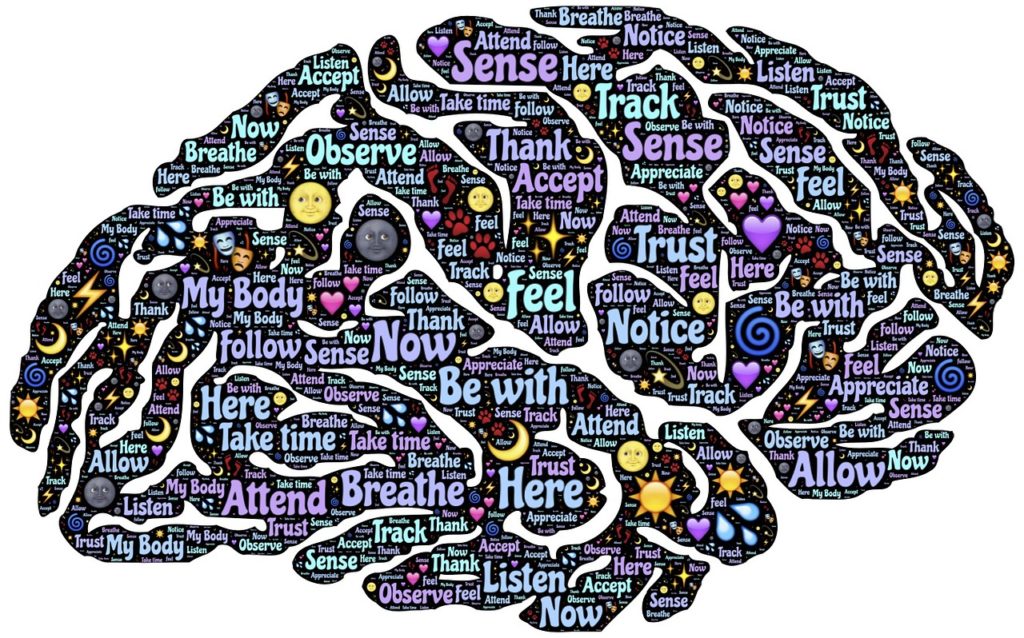SQ-4.1
Audio Presentation: Thoughts about Thoughts…
This exercise in sitting quietly is helpful in understanding – actually by considering – how our thoughts can help, hurt, or mislead us. For most of us, this is not obvious; nor are we even aware that this is so! Yet – being able to look at one’s thoughts, and determine how useful and relevant they are – or not! – is critical in developing healthy psychological skills and habits[1] that lower anxiety, reduce stress, avoid depression, and best of all improve our ability to problem-solve.
Note this exercise is learned in stages. That is, start with one or two of the six observations about thoughts in your first practice…and then add one or two each day. By the end of a week you will have the entire exercise down, and will likely be processing (i.e., looking at, testing, understanding, internalizing) some or all of them.
________
Getting started…
- Sit up and get comfortable…and after bringing your focus to the breath, take a few and then think, “Don’t expect anything.”
Observations about Thoughts…
- After a few more focused breaths, say to yourself “Let’s consider…” and then, preface each observation in the following list with: “My thoughts…”
- may, or may not, be true. Whoa, really!? Many thoughts can derive from a faulty bias or insufficient information, or even just plain ignorance. And some are not only false, they’re just plain nonsense!
- are definitely not commands I have to obey, nor rules I have to follow. They are just thoughts and do not have power over me.
- cannot be a threat or hurt me. Hey, they are, actually, just words & voices & images in my head…
- may often stem from delusion. We may not like it but our lives have been subject to dysfunctional conditioning…certainly from childhood but also always a potential daily risk. Delusion, while not our friend, is nevertheless a constant peril.
- can [and should] be allowed to come and go of their own accord. It’s most likely unhelpful to either hold onto them…or push them away…so stop trying! Investigate, yes; ruminate, no.
- may, or may not, be important. Whoa [again], really!? Important thoughts can lead to, or are the essence of, personal well-being…but then don’t let ego and self-interest blind you to the feelings and wellbeing of others as well.
- may, or may not, be true. Whoa, really!? Many thoughts can derive from a faulty bias or insufficient information, or even just plain ignorance. And some are not only false, they’re just plain nonsense!
- In subsequent exercises, as you go through the list, pause after each observation…and see how it can become a deeper learning moment as you investigate its actual meaning and relevance…
Application Note: After doing this some number of times, each item will start to become internalized[2] – this is, in part, the objective…and means it will be something you know as well as something you (i.e., your Elephant!) will gladly use to your advantage. This will become manifest in developing a certain intellectual humility, one that results in you being more open to hearing and considering what others have to say. But then you will also acquire a healthy yet helpful skepticism in believing what others have to say. After all, their thinking is subject to the same considerations…
Concluding…
- When you’ve completed the list and your contemplation of it, take a moment to smile…then, gently open your eyes, and step calmly into the rest of your day…
__________________________________________
[1] Yes, habits! Habits are singular examples of conditioning…and nicely demonstrate, as in good habits vs bad habits, the difference between positive, useful, and “appropriate” conditioning and negative or dysfunctional conditioning.
[2] As in positively conditioned!

